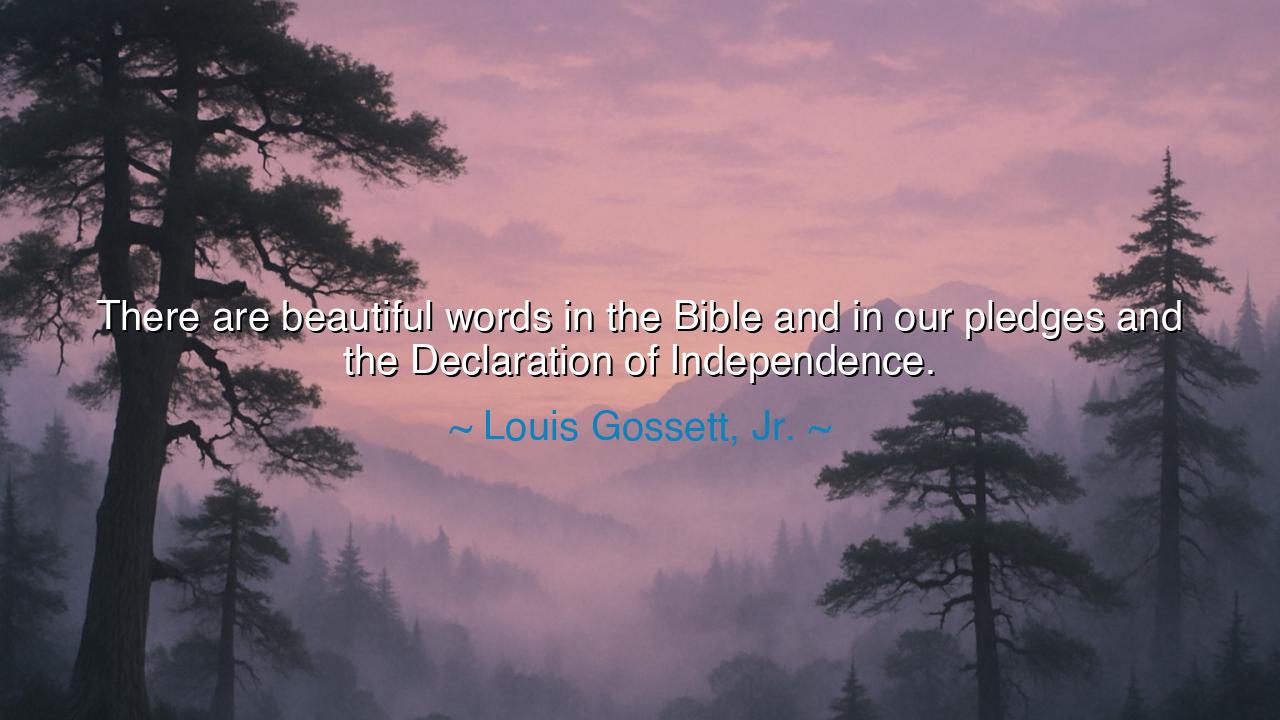
There are beautiful words in the Bible and in our pledges and the
There are beautiful words in the Bible and in our pledges and the Declaration of Independence.






The words of Louis Gossett Jr., when he said, “There are beautiful words in the Bible and in our pledges and the Declaration of Independence,” are more than a reflection — they are a reverent reminder. In these words, he speaks not only of texts, but of ideals; not only of language, but of faith, duty, and freedom. His tone is not one of casual admiration but of solemn recognition — a recognition that within these words lies the moral foundation of a people. For in the Bible, in the pledges, and in the Declaration of Independence, the human spirit has recorded its most sacred vows: to God, to one another, and to liberty itself.
In the Bible, Gossett finds the first source of beauty — the spiritual wellspring from which all conscience flows. It is the book of beginnings, where man learns humility before the divine and compassion toward his brother. Its words speak of love, forgiveness, sacrifice, and the eternal struggle between good and evil. They are not merely verses to be recited, but laws to be lived, guiding the heart through darkness and reminding each generation of the sacred dignity of the human soul. The beauty of the Bible lies not in ornament, but in truth — truth written in the language of eternity. It whispers to all who read it that justice and mercy are not separate paths, but two halves of the same divine light.
When he speaks of the pledges, Gossett calls upon the moral covenant of community. The Pledge of Allegiance, though born of modern history, carries within it an ancient longing — the yearning of human beings to belong, to unite under shared principles of liberty and justice. These are not empty phrases, but promises that must be renewed in each generation. “One nation, under God, indivisible, with liberty and justice for all” — such words are not a boast, but a prayer. They remind us that unity without righteousness is fragile, and that freedom without equality is incomplete. To pledge is to promise, and to promise is to hold oneself accountable before one’s fellow citizens and one’s Creator.
Then comes the Declaration of Independence, the third pillar of Gossett’s reflection — the great political scripture of the modern world. Written in ink but consecrated in blood, it is the testament of a people who dared to say that all men are created equal, endowed by their Creator with unalienable rights. These words, as Gossett reminds us, are beautiful, not because they are perfect, but because they are aspirational — a bridge between the world as it was and the world as it ought to be. They carry the sound of thunder and the scent of hope, calling upon each generation to fulfill the promise that others only began. Like the prophets of old, those founders spoke into history not only what was, but what must one day be.
Consider the life of Martin Luther King Jr., who stood at the crossroads of these three sources — the Bible, the pledge, and the Declaration — and wove them into a single moral vision. When he said, “I have a dream,” he was not inventing new doctrine, but fulfilling old ones. He took the divine justice of Scripture, the civic promise of the pledge, and the revolutionary faith of the Declaration, and reminded America of her unfinished symphony. His voice rang out like that of a prophet, calling a nation not to shame, but to renewal — to become what it had always proclaimed itself to be. His life, like Gossett’s words, teaches us that beauty in words must be matched by honor in action.
Yet Gossett’s wisdom also carries a warning. For beauty, when admired but not lived, becomes hypocrisy. Words, however sacred, are powerless unless they are embodied. The Bible, the pledge, and the Declaration all demand participation — not passive reverence, but active faith. To recite without reflection is to miss their meaning; to quote without conviction is to betray their spirit. The ancients knew this well — that truth spoken but not practiced turns to dust. Thus, Gossett’s words are both a hymn and a challenge: to make the beauty of these words visible in how we live, how we love, and how we serve.
So, O listener, take this lesson into your heart. Let your reverence for these sacred texts not rest upon your tongue, but dwell in your deeds. Read the Bible and let its mercy shape your soul. Speak the pledge and let it remind you of your duty to your neighbor. Study the Declaration and let its fire kindle your courage to defend the oppressed and the forgotten. For the beauty of these words is not in their poetry, but in their power to awaken what is noble in humankind.
Thus, the teaching of Louis Gossett Jr. endures: that beautiful words are the seeds of a beautiful world — but only if we dare to plant them in the soil of our lives. Words of faith, words of unity, words of freedom — they are not relics of the past, but instruments of destiny. Cherish them, live them, and pass them forward, that generations yet unborn may find in them what we have found: the enduring light of divine truth and human hope.






AAdministratorAdministrator
Welcome, honored guests. Please leave a comment, we will respond soon